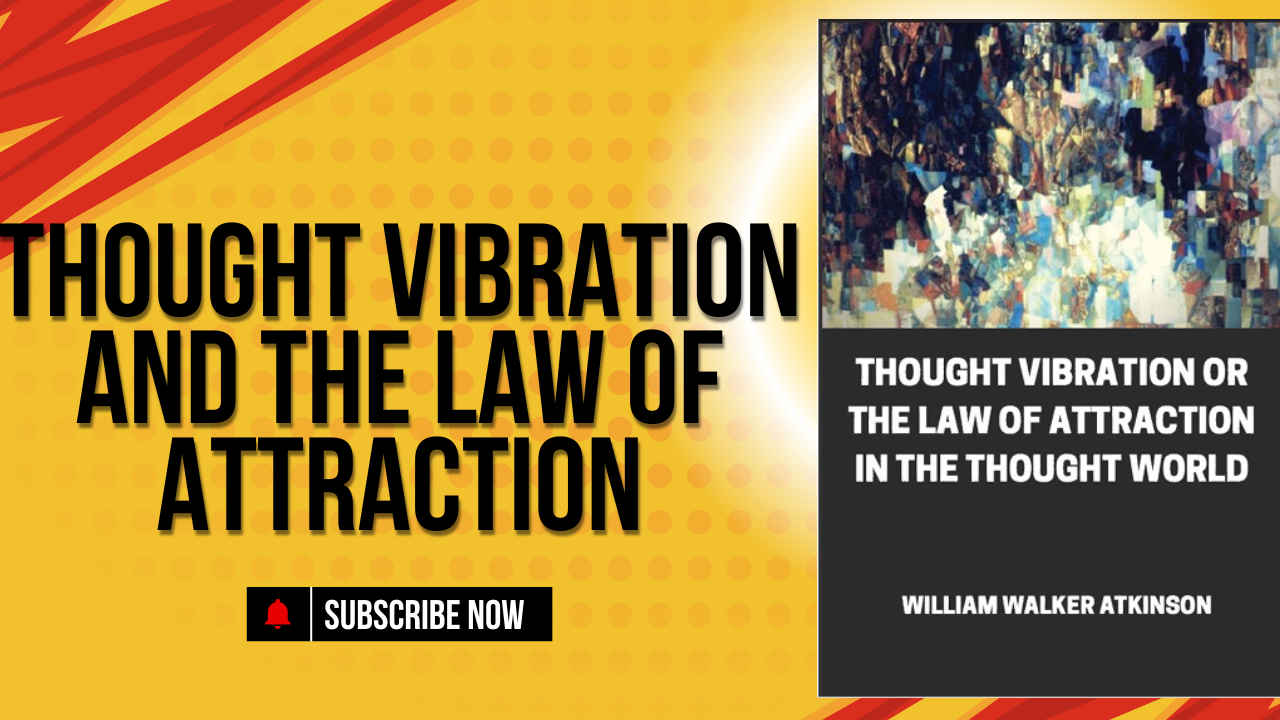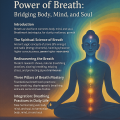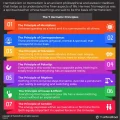
William Walker Atkinson’s 1906 work, “Thought Vibration or the Law of Attraction in the Thought World,” explores the principle that thoughts are a form of energy that attract corresponding vibrations and experiences. Atkinson argues that individuals can consciously harness this “Law of Attraction” by cultivating positive mental states and desires, thereby influencing their circumstances. The book provides guidance on developing mental control, overcoming negative thought patterns like fear and worry, and cultivating willpower to shape one’s reality. Atkinson emphasizes self-reliance and conscious mind-building over dependence on external teachings, advocating for the active application of mental principles to achieve success and personal growth. He presents a framework for understanding the power of thought and its impact on individual lives, encouraging readers to take control of their mental landscape to manifest desired outcomes.

FAQs on “Thought Vibration or the Law of Attraction in the Thought World”
1. What is the central idea behind the Law of Attraction, as described in the book?
The Law of Attraction posits that thoughts are a form of energy that vibrate and attract corresponding experiences and circumstances. Like attracts like, so positive and focused thoughts will draw positive outcomes, while negative thoughts will lead to negative results. By consciously directing one’s thoughts, individuals can shape their reality. The book emphasizes that this isn’t merely wishful thinking but a fundamental principle governing the thought world.
2. How does the book define and explain the concept of thought-waves?
The book describes thoughts as creating “thought-waves” that radiate outwards, similar to ripples in water. These waves travel through a “sea of Mind,” and, importantly, possess the property of reproducing themselves by awakening similar vibrations in attuned minds. The strength and nature of one’s thoughts determine the character of the thought-waves received from others; minds attuned to positive, confident thoughts are less affected by negative thoughts emanating from others.
3. How can one become “immune” to negative thought attraction, according to the text?
The book recommends raising one’s “mental keynote” through force of will. By cultivating a positive mental attitude (confidence, courage, cheerfulness), individuals can shut out depressing thoughts and align with positive thought-waves from others. Affirmations and auto-suggestions serve to establish new mental attitudes and raise this keynote, making one less susceptible to negative influences and more receptive to positive ones.
4. What is the role of “Will Power” in the Law of Attraction, and how can it be developed?
The book argues that everyone has a strong Will, but the key is training the mind to use it effectively. Instead of strengthening the Will itself, the emphasis is on training the mind to recognize and harness the inherent Will Power already present. This can be achieved through consistent practice, starting with small acts of volition and gradually increasing the demands. Auto-suggestion (“I Am Using My Will Power”) and undertaking disagreeable tasks are suggested exercises. Strong desire and interest in a goal are also said to activate Will Power.
5. How does the book advise handling negative emotions like fear, worry, and jealousy?
The text advises directly confronting negative emotions through affirmations and redirection of thought. Instead of trying to suppress them directly, it suggests cultivating the opposite positive emotions, such as love, courage, and cheerfulness. “Acting out” the positive emotion, even when not genuinely felt, can gradually transform the underlying mental attitude. Over time, positive thoughts and emotions starve out the negative ones.
6. What does the text say about the relationship between the conscious and subconscious mind in manifesting desires?
The book stresses that the subconscious mind plays a significant role in manifesting desires. When one is consumed by a desire, the subconscious mind actively works to generate plans, ideas, and opportunities to fulfill it. Concentrating one’s thought-force and avoiding “mental leaks” is vital, as scattered thoughts can prevent the subconscious from focusing effectively. The subconscious mind also influences the Law of Attraction, drawing in people and resources aligned with the ruling passion or desire.
7. What role do desire and confidence play in achieving one’s goals, according to the book?
Strong desire, or “desire force,” is presented as a primary motivator and attractor. One must “want” something intensely, even being willing to sacrifice lesser desires that stand in its way. Coupled with desire, confidence and the “I Can and I Will” mentality are essential for attracting the necessary resources and opportunities. Fear, conversely, paralyzes desire and hinders progress.
8. What is the book’s perspective on “chance” or “luck”?
The book strongly rejects the notion of chance or luck, asserting that everything is governed by the Law of cause and effect. Seemingly random events are the result of underlying forces and mental attitudes. Those who attribute their success or failure to luck are simply not recognizing the power of their own thoughts and beliefs in shaping their circumstances. Adopting a positive mental attitude and aligning with the Law of Attraction are presented as the keys to consistent success, making so called “luck” simply the manifestation of these forces.
Thought Vibration: A Study Guide
Quiz
Answer each question in 2-3 sentences.
- According to the author, what is the relationship between thoughts and things?
- How does the Law of Attraction function in the thought world?
- Explain the concept of thought-waves and how they are transmitted.
- What does it mean to be on a “positive” or “negative” plane of thought, and how does this affect one’s life?
- How can affirmations and auto-suggestions be used to change one’s mental state?
- Explain the author’s view of “Will Power.” Does it require training, or does the Mind?
- According to the author, how can you re-establish order within your mental kingdom?
- What does the author mean by “mental leaks” and how do they hinder one’s progress?
- What is the relationship between desire, interest, and success, according to the author?
- How can one claim what is rightfully theirs, according to the author, and why is it important to believe you are worthy?
Answer Key
- The author believes that thoughts are things, possessing a magnet-like power of attraction. This means the thoughts you dwell on will attract similar experiences and circumstances into your life.
- The Law of Attraction in the thought world dictates that like attracts like. Positive thoughts attract positive experiences, while negative thoughts attract negative ones.
- Thought-waves are like ripples in a sea of Mind, moving in all directions from a common center. They have the property of reproducing themselves, awakening similar vibrations in minds attuned to receive them.
- Being on a positive plane means feeling strong, confident, and courageous, attracting positive thoughts and experiences. Conversely, being on a negative plane involves feelings of discouragement and failure, attracting negative thoughts and outcomes.
- Affirmations and auto-suggestions help establish new mental attitudes and raise one’s mental keynote, allowing individuals to benefit from positive thought-waves of others on the same plane of thought.
- The author believes every man has, potentially, a strong will, and that all he has to do is to train his mind to make use of it. The author contends that mind requires training, not will.
- Re-establishing order in the mental kingdom involves asserting the “I” (the real self) over the subordinate parts of oneself, mastering emotions, appetites, and passions through the assertion of the Will.
- “Mental leaks” refer to the habit of having one’s attention distracted by every passing fancy. This scatters thought-force, preventing the mind from effectively working towards a specific goal.
- Desire and interest are the driving forces behind action and success. Strong desire awakens interest, stimulating subconscious work that brings valuable ideas and attracts assistance from others.
- One can claim what is rightfully theirs by recognizing that they are worthy of the best and having the confidence and courage to demand and take possession of it. Believing in one’s worthiness removes internal resistance and allows the Law of Attraction to operate effectively.
Essay Questions
Write an essay addressing each of the following prompts.
- Discuss the role of individual responsibility in shaping one’s reality, according to the author. To what extent are we responsible for our circumstances, and how can we change them through our thoughts and actions?
- Explore the author’s concept of “self-mastery” and its importance in personal development. How does one achieve mastery over their lower self, and what are the benefits of doing so?
- Analyze the author’s views on the power of belief and expectation in achieving success. How do our beliefs shape our actions and outcomes, and how can we cultivate a more positive and empowering belief system?
- Compare and contrast the concepts of “desire” and “fear” as forces of attraction. How do these emotions influence our lives, and how can we harness the power of desire while overcoming fear?
- Evaluate the author’s claim that there is “Law, Not Chance” in the universe. Do you agree that all events are governed by underlying laws, and what are the implications of this perspective for personal agency and responsibility?
Glossary of Key Terms
- Law of Attraction: The principle that like attracts like in the thought world; positive thoughts attract positive experiences, and negative thoughts attract negative ones.
- Thought-Vibrations/Thought-Waves: Manifestations of energy emanating from thoughts, capable of influencing oneself and others.
- Positive Plane: A mental state characterized by feelings of strength, confidence, and courage, attracting positive thoughts and experiences.
- Negative Plane: A mental state characterized by feelings of discouragement and failure, attracting negative thoughts and outcomes.
- Affirmations: Positive statements used to reinforce desired thoughts, feelings, and behaviors.
- Auto-Suggestions: The act of influencing one’s subconscious mind through repeated suggestions or affirmations.
- The “I”: The Real Self. The conscious, sovereign aspect of the individual, capable of controlling the subordinate mental faculties.
- Will Power: The instrument of the “I.” The capacity to exert conscious control over one’s thoughts, emotions, and actions.
- Habit-Mind: The subconscious mind, which is responsible for automatic habits and behaviors.
- Mental Leaks: The scattering of thought-force caused by allowing one’s attention to be distracted by every passing fancy.
- Desire Force: The attractive power of strong desire, which draws to oneself the people, things, and circumstances necessary for its fulfillment.
- Mental Attitude: One’s prevailing state of mind.
- Mental Control: The ability to manage and direct one’s thoughts, preventing them from becoming tyrannical masters.
- Dynamic Forces: The powers of energy and invincible determination.
- Mental Atmosphere: The character caused by the prevailing mental attitude.



















0 responses on "Thought Vibration and the Law of Attraction"